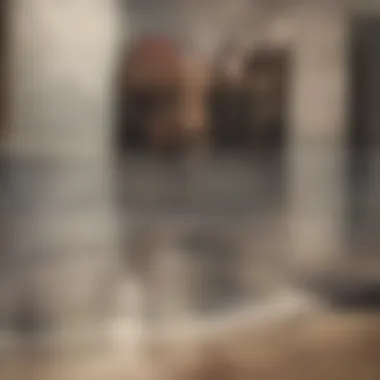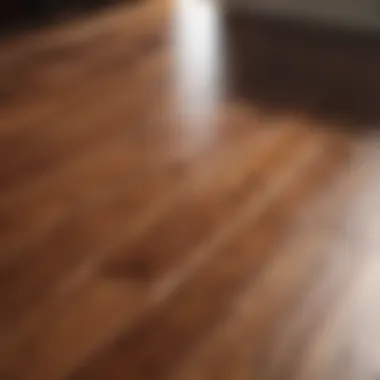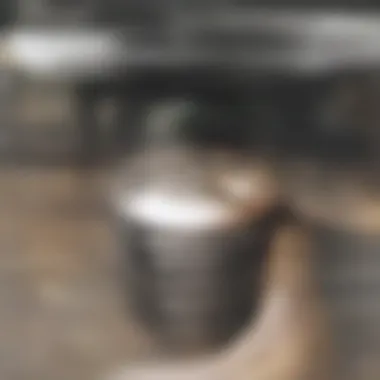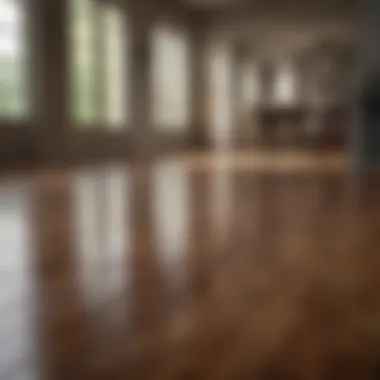Effective Hardwood Floor Cleaning with Vinegar


Intro
Hardwood floors are a popular choice in many homes for their aesthetic appeal and durability. However, maintaining their elegance requires proper cleaning methods that safeguard their finish and longevity. One unexpected yet effective cleaning agent is vinegar. It is readily available, eco-friendly, and cost-effective. This article examines how vinegar can be employed to clean hardwood floors while preserving their natural beauty.
Vinegar contains acetic acid, a natural compound that works well to dissolve dirt and grime. However, caution is needed to ensure that the floor's finish is not compromised. Understanding how to use vinegar correctly is imperative. This guide will dive into the cleaning methodology, considerations for different finishes, and additional tips for maintaining hardwood floors effectively.
Prelims to Hardwood Floor Care
Maintaining hardwood floors is a significant task for any homeowner. These floors offer beauty and warmth but demand appropriate care to sustain their appeal and longevity. This section examines the principles of hardwood floor maintenance, emphasizing its critical role in preserving the overall integrity and aesthetics of the floors.
In this article, we will explore how specific cleaning methods impact the health of hardwood. This is not only about maintaining appearance but also about ensuring that the floor's surface remains resilient against wear and tear. One of the central themes is the use of vinegar, a cost-effective and accessible cleaning solution, which we will cover extensively later.
Understanding Hardwood Floors
Hardwood floors are made from solid wood, typically oak, maple, or cherry. Understanding the unique properties of each wood type is crucial for appropriate care. They can be susceptible to scratches, moisture, and fading when exposed to sunlight. Knowing the specific characteristics of your hardwood helps you determine the best cleaning techniques.
Additionally, there are various finishes available on hardwood floors, such as polyurethane, oil, or lacquer. These finishes affect how the floor reacts to different cleaning agents, including vinegar. Being informed about these details is essential for preventing potential damage.
Common Challenges in Cleaning
Cleaning hardwood floors presents several challenges. First, improper cleaning methods can lead to irreparable damage. For example, using excessive water can cause the wood to swell and warp. Furthermore, some common household cleaners can strip away the finish, leaving the floor vulnerable.
Another challenge is the build-up of dirt and grime in areas that are frequently used, like hallways and entryways. This accumulation requires more effort to remove while still protecting the wood's surface.
To summarize, understanding hardwood floors and the challenges in cleaning them is vital for effective maintenance. With proper knowledge and techniques, including the use of vinegar, homeowners can keep their hardwood floors looking new and lasting longer.
The Role of Vinegar in Cleaning
Vinegar is often regarded as a versatile household cleaning agent. Its effectiveness in removing stains and disinfecting surfaces makes it an attractive option for many homeowners. When it comes to hardwood floors, vinegar brings both benefits and considerations that are crucial to understand.
The cleaning properties of vinegar derive from its acetic acid content, which typically ranges from 4% to 8% in household varieties. This acidity helps break down dirt and grime, making cleaning more efficient. However, it is critical to note that vinegar’s acidity can also affect certain finishes on hardwood floors. This brings into question how frequently and in what manner it should be used.
In this section, we will analyze the chemical composition of vinegar, its benefits in floor cleaning, and potential drawbacks. This will set the stage for better understanding how to utilize vinegar effectively and safely in the context of hardwood floor care.
Chemical Composition of Vinegar
As mentioned earlier, vinegar primarily consists of acetic acid, water, and trace amounts of other acids. The essential element here is acetic acid, responsible for the cleaning properties. This substance can break chemical bonds in grime, allowing for easy removal when wiped away.
A common type of vinegar used for cleaning is white vinegar. It can be diluted with water, often in a 1:1 ratio, to make a suitable cleaning solution for hardwood floors. The mild nature of this dilution is ideal for most hardwood finishes, although it’s always advisable to test compatibility beforehand.
Benefits of Using Vinegar
Using vinegar to clean hardwood floors presents several advantages:
- Natural Disinfectant: Vinegar can kill some bacteria and molds, contributing to a cleaner home environment.
- Cost-Effective: It is usually less expensive compared to commercial cleaning products.
- Eco-Friendly: As it is a natural product, it is biodegradable and doesn’t contain harmful chemicals often found in synthetic cleaners.
- Non-Toxic: This characteristic is especially important for homes with pets and children, as it does not emit toxic fumes.


Moreover, vinegar can easily dissolve mineral deposits from water stains, restoring the floor's appearance. Given these benefits, vinegar is a favorable choice for homeowners concerned about both cleanliness and environmental impact.
Potential Drawbacks to Consider
Despite its advantages, vinegar does have some drawbacks to keep in mind:
- Acidic Nature: The acidity can harm certain finishes over time. It can strip away protective coatings, leading to deterioration of the wood’s surface.
- Odor: The pungent smell of vinegar might not be appealing to everyone. Though it dissipates quickly, some might find it unpleasing during the cleaning process.
- Not for All Woods: Certain types of wood are more sensitive to acidic substances. This means that the vinegar solution might not be suitable for all hardwood varieties without careful testing.
Preparing to Clean with Vinegar
Cleaning hardwood floors is a significant task that requires careful preparations. Using vinegar as a cleaning agent can be effective, but it is essential to be well-prepared before starting the cleaning process. The right approach will enhance not only the effectiveness of the cleaning but also help in maintaining the integrity and appearance of the floors.
Firstly, preparing to clean with vinegar allows for an organized and efficient cleaning experience. When the necessary supplies are readily available, you minimize the time spent looking for items. This is especially important for hardwood floors, as prolonged exposure to water and moisture can be harmful to the wood. A well-structured cleaning regimen helps prevent damage while ensuring efficient dirt and grime removal.
Additionally, understanding the finish on your hardwood is crucial. Different finishes can react differently to cleaning solutions, making it necessary to identify the type prior to cleaning. Not all hardwood floors respond the same way to vinegar. This preparation will help safeguard your flooring investment while achieving a clean surface.
Gathering Necessary Supplies
Before beginning the cleaning process, gather all necessary supplies. This makes the task much smoother. Here are essential items you will need:
- White vinegar: This will be your primary cleaning agent.
- Water: Used for diluting vinegar to create an effective cleaning solution.
- Bucket: For mixing the vinegar and water solution.
- Mop or soft cloth: Choose a microfiber mop for safe cleaning without scratching the floor.
- Broom or vacuum: To remove loose debris and dust prior to mopping.
- Measuring cup: For accurate measurement of vinegar.
Having these supplies ready will allow you to clean efficiently, without interruptions. Proper tools make a noticeable difference in the cleaning outcome, helping to prevent any scratches or water damage.
Testing for Finish Compatibility
Before applying vinegar to your hardwood floors, it is crucial to test for compatibility with the floor's finish. Not all wood finishes can tolerate vinegar safely. Certain finishes, like polyurethane, may become damaged if vinegar is used excessively or improperly.
To test compatibility:
- Select a small, inconspicuous area of the floor.
- Dilute a small quantity of vinegar in water, following a basic ratio of 1 part vinegar to 4 parts water.
- Apply a small amount of this solution to the spot.
- Wait for a few minutes and assess any reaction.
If there is no discoloration, cloudiness, or damage after testing, it is likely safe to use the vinegar solution on the entire floor. If you notice any adverse reactions, consider alternative cleaning agents designed specifically for your wood's finish type.
Taking these precautions ensures the longevity of your hardwood flooring while achieving a clean and polished appearance.
How to Clean Hardwood Floors with Vinegar
Cleaning hardwood floors is an essential aspect of maintaining their beauty and durability. The use of vinegar, a common household item, has gained popularity among homeowners. It serves as an effective cleaning agent that can remove dirt and grime without damaging the floor finish. In this section, we will focus on three key aspects: creating the right vinegar solution, the best practices for application, and how to ensure your floors dry properly after cleaning.
Creating the Vinegar Solution
To effectively clean hardwood floors with vinegar, preparation is key. The right vinegar solution can make a significant difference in cleaning outcomes. A common ratio is mixing one part vinegar with three parts water. This dilution balances the acidity of vinegar, making it effective enough to cut through dirt while being gentle on the wood finish. You can also add a few drops of dish soap to enhance the cleaning power, especially for tougher stains. Additionally, using warm water helps in dissolving grime more efficiently. Pour this mixture into a clean bucket and ensure you mix it well before application.
Application Techniques
Applying the vinegar solution properly is critical for achieving the best results. Start by sweeping or vacuuming the floor to remove loose debris. This step is crucial since debris can scratch the surface during cleaning. After that, take a microfiber mop to apply the vinegar solution. Dip the mop into the solution, allowing it to soak, but do not soak the mop excessively. Excess water can damage hardwood floors. Instead, lightly dampen the mop and work in small sections, following the wood grain. It is advisable to rinse the mop frequently to avoid spreading dirt back onto the floor. If you encounter tough stains, consider using a soft-bristled brush to gently scrub those areas.


Drying and Final Touches
Once you have cleaned the floors with the vinegar solution, drying them properly is essential. Avoid leaving any moisture on the surface, as it may lead to warping or other forms of damage. Use a clean, dry microfiber cloth to wipe any remaining dampness. This cloth can help absorb any excess moisture while performing a final inspection for spots you might have missed. For added shine, you can apply a small amount of mineral oil to a cloth and buff the floors. This can enhance the wood's natural appearance after cleaning. Remember to let the floor air out for a short while to permit any remaining moisture to evaporate completely.
"Using vinegar for cleaning hardwood floors can be both cost-effective and environmentally friendly, promoting a more sustainable cleaning routine."
These steps are crucial in ensuring that your hardwood floors remain in excellent condition while benefiting from the natural cleaning properties of vinegar. By following these guidelines, homeowners can maintain their floors' integrity, ensuring they last for years to come.
Alternative Cleaning Solutions
Finding the right cleaning method for hardwood floors is crucial. While vinegar serves as an effective natural option, it is vital to explore other cleaning solutions available on the market. This section highlights the significance of alternative cleaning solutions, covering both commercial products and homemade alternatives. By understanding these different options, homeowners can make more informed decisions about what aligns best with their cleaning preferences and floor care needs.
Commercial Cleaners
Commercial cleaners designed for hardwood floors offer convenience and effectiveness. These products are specifically formulated to remove dirt, grime, and stains without damaging the floor’s finish. One major benefit of using commercial cleaners is their ability to deliver a consistent cleaning result. Many people appreciate that these formulas often come with clear instructions, ensuring that users can easily follow the recommended application methods for optimal results.
Some notable commercial cleaners include:
- Bona Hardwood Floor Cleaner
- Murphy Oil Soap
- Swiffer WetJet Hardwood
However, it is important to read labels carefully. Some commercial cleaners contain harsh chemicals that may harm your floor over time. Always ensure compatibility with your floor's finish before use.
"Choosing the right cleaner can extend the life of your hardwood floors and preserve their beauty."
Additionally, eco-friendly options are increasingly popular, appealing to environmentally conscious consumers. Brands like Seventh Generation and Method create non-toxic cleaners that still deliver on cleaning performance.
Homemade Alternatives
For those who prefer a more natural approach, homemade alternatives can be an excellent choice. These solutions generally utilize readily available household items. Common ingredients include:
- Olive oil with vinegar
- Baking soda and water
- Dish soap mixed with water
A popular recipe involves mixing one part vinegar with one part olive oil. This mixture cleans effectively while leaving a protective sheen. However, it’s essential to remember that homemade cleaners may not offer the same deep cleaning power as commercial options.
When creating your own cleaning solution, it’s crucial to test it on a small, inconspicuous area first. Some homemade cleaners can leave residues or may not be suitable for all finishes.
Both commercial and homemade cleaners present viable options for hardwood floor cleaning. Evaluating specific needs, floor types, and cleaning preferences can help homeowners choose the best method. This exploration of alternative cleaning solutions enhances the floor maintenance strategies, ensuring that the longevity and aesthetics of hardwood floors are maintained.
Maintaining Hardwood Floors Post-Cleaning
Maintaining hardwood floors after cleaning is a critical aspect that cannot be overlooked. Once the initial cleaning has taken place, it is essential to adopt a continuous care routine to preserve the appearance and longevity of the flooring. Maintaining these surfaces not only enhances their aesthetic appeal but also prevents potential damage that could arise from neglect. Regular upkeep can ultimately minimize costs related to repairs or refinishing, making it an investment in the overall value of the property.
Regular Maintenance Routines
Regular maintenance of hardwood floors involves a systematic approach that includes frequent cleaning and periodic care. Here are some essential practices:
- Sweep or Vacuum Regularly: Dust and dirt can accumulate quickly. Daily sweeping with a soft broom or vacuuming using a wood floor attachment can prevent scratches and dullness.
- Mopping with Care: When mopping, use a damp mop rather than a soaking wet one. Excess water can seep into cracks, harming the wood over time. A mixture of vinegar and water can be effective if diluted properly.
- Use Area Rugs: Place rugs in high-traffic areas to protect the wood from wear and tear. This includes entry points and places where furniture is frequently moved.
- Trim Pet Nails: If you have pets, keep their nails trimmed to prevent scratches on the floor.
- Avoid Harsh Cleaners: Only use products that are safe for hardwood. Chemical cleaners can strip finishes and cause long-term damage.


Maintaining a consistent routine will not only preserve the beauty of the hardwood but also create a clean environment in the home.
Signs of Wear and Damage
It is crucial to be vigilant regarding the signs of wear and damage on hardwood floors. Catching these signs early can save homeowners significant time and expense. Key indicators to look for include:
- Scratches and Scuffs: Frequent foot traffic can lead to visible scratches. Light scratches may be addressed with a touch-up kit, while deeper ones might require professional refinishing.
- Discoloration: Uneven color patches may indicate that the finish is wearing off, especially in sun-exposed areas.
- Warpage or Cupping: Wooden boards can warp due to excess moisture or drastic temperature changes. This requires immediate attention to prevent further damage.
- Creaking Sounds: Noises, such as creaking when walking, could mean that boards are loose or the underlay is compromised.
Being proactive about these signs can make a significant difference in the longevity of the flooring, ensuring they remain a beautiful and functional addition to the home.
"Regular maintenance is the secret to a lasting beautiful finish on hardwood floors. Neglect can lead to problems that require extensive repairs."
By prioritizing these maintenance practices and being responsive to any signs of damage, homeowners can enjoy their hardwood floors for many years. This not only enhances the living space but also sustains the value of the investment.
Expert Insights and Recommendations
In the realm of hardwood floor care, expert insights are invaluable. They provide clarity on techniques and methods that have been proven effective. Relying on expert recommendations ensures the preservation of your flooring’s beauty and integrity. This section delves into the significance of both professional cleaning services and long-term preservation strategies.
Professional Cleaning Services
Employing professional cleaning services can be a wise choice, particularly for intricate hardwood floors. Professionals understand nuances that an average homeowner may overlook. They typically possess specialized tools and knowledge about various finishes. This means that they can select appropriate cleaning solutions that avoid further damaging your floors.
Benefits of using professional services include:
- Expert Assessment: Professionals assess the condition of the floor to tailor their techniques accordingly.
- Use of Appropriate Products: They use products that align with the floor’s finish to ensure safety.
- Time Efficiency: Hiring professionals frees up your time, resulting in a thorough cleaning without the hassle.
- Long-Term Care Knowledge: These experts often provide guidance on ongoing maintenance strategies tailored for your specific type of hardwood.
For those considering professional cleaning, take time to research local services. Look for reviews online, particularly on platforms such as Reddit. You can also seek recommendations from friends and family.
Long-term Floor Preservation Strategies
The focus on long-term preservation combined with regular cleaning can extend the life of hardwood floors significantly. Here are key strategies homeowners should consider:
- Establish a Regular Cleaning Routine: Developing a consistent cleaning schedule is vital. Regularly sweeping or vacuuming prevents dirt accumulation, which can scratch surfaces over time.
- Use Appropriate Mats: Placing mats at entrances helps trap dirt and moisture before it reaches the hardwood.
- Control Humidity Levels: Hardwood is sensitive to moisture changes. Maintaining a stable indoor climate can prevent warping and cracking. Using a humidifier in winter months may help.
- Recoat When Necessary: Applying a fresh coat of finish every few years can restore shine and protect against wear.
- Avoid Excess Water: When cleaning, it’s critical to avoid saturating the floor with water or cleaning solutions. Stick to damp mopping instead.
Implementing these strategies can lead to sustainable care for your hardwood floors. As a result, you can enjoy their aesthetic appeal for years to come.
Ending
The significance of the conclusion in this article lies in its ability to synthesize the main themes discussed throughout the text. It emphasizes the practical applicability of vinegar as a cleaning agent for hardwood floors. The careful inclussion of its benefits and drawbacks aids the homeowner or design enthusiast in making informed decisions about their floor maintenance. A clear understanding of the cleaning process and the alternatives available can shape one's approach to home care.
This section also reiterates the importance of regular maintenance routines for hardwood floors. By recognizing the signs of wear and the potential issues associated with neglect, individuals can prolong the life of their flooring.
"Being proactive is key to maintaining beautiful hardwood floors using vinegar."
In reflecting on the overall message, it's clear that vinegar, as a natural cleaning solution, effectively combines ease of use with environmental sustainability.
Recap of Key Points
- Vinegar's Efficacy: The effectiveness of vinegar in cleaning hardwood floors is notable. Its natural acidity can help remove dirt and grime without harsh chemicals.
- Preparation is Key: Proper preparation, including testing compatibility with flooring finishes, is crucial to avoid damage.
- Technique Matters: The methods of application, from how to create the cleaning solution to the drying process, play a decisive role in the results.
- Alternative Solutions: While vinegar is beneficial, understanding and exploring other cleaning agents can also provide additional options.
- Ongoing Care: Regular maintenance and keen observation for wear and damage focalizes preserving the aesthetics and extending the longevity of hardwood floors.
Final Thoughts on Vinegar as a Cleaning Agent
Vinegar emerges as a valuable tool in the cleaning arsenal for hardwood floors. Its low cost and accessibility make it an attractive option for homeowners. However, the results can vary based on the condition of the floor and the specific finishes used. This duality presents an imperative to approach vinegar use with a certain level of caution. Overall, when executed properly, using vinegar can yield impressive cleanliness without significant risk to the flooring's integrity. A profound understanding of the cleaning dynamics involved allows users to navigate their cleaning routines with confidence.







